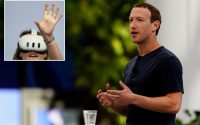NPR quits Twitter over Elon Musk ‘state-affiliated media’ label flap
National Public Radio said Wednesday it is quitting Twitter in response to the decision by the social media platform’s billionaire owner Elon Musk to label the outlet’s accounts as “state-affiliated media.”
NPR said it is “turning away from Twitter” and will no longer post new content across its 52 accounts on the social media site. The outlet urged readers to find its content in other ways.
“NPR’s organizational accounts will no longer be active on Twitter because the platform is taking actions that undermine our credibility by falsely implying that we are not editorially independent,” NPR said in a statement to The Post on its decision.
“We are not putting our journalism on platforms that have demonstrated an interest in undermining our credibility and the public’s understanding of our editorial independence,” the statement added.
The Post has reached out to Twitter for comment. Musk recently set Twitter’s email account for press requests to auto-reply to all inquiries with a poop emoji.
Musk raised eyebrows last week following Twitter’s decision to slap the “state-affiliated media” label on NPR’s main account – the same designation that applies to government-run accounts such as Russia Today and China’s Xinhua news agency.
At the time, Musk shared language from Twitter’s guidelines that defined “state-affiliated media” as “outlets where the state exercises control over editorial content through financial resources, direct or indirect political pressures, and/or control over production and distribution.”
After a public outcry by NPR, the White House, and various other critics, Twitter reversed course and changed the label to “government-funded media” – the same designation given to the BBC.

NPR derives the majority of its revenue from sponsorship deals and customer fees. The organization said it receives “less than 1 percent of its $300 million annual budget from the federally funded Corporation for Public Broadcasting.”
NPR CEO John Lansing said the decision to quit Twitter was necessary to protect the brand’s journalistic reputation from a “shadow of negativity.”

“The downside, whatever the downside, doesn’t change that fact,” Lansing said in an interview posted on NPR’s website. “I would never have our content go anywhere that would risk our credibility.”
Lansing added that NPR would not resume activity on Twitter even if Musk removed the label entirely.
“At this point, I have lost my faith in the decision-making at Twitter,” he added. “I would need some time to understand whether Twitter can be trusted again.”

The NPR CEO noted that the outlet’s reporters and other employees could make their own decision on whether to remain active on Twitter.


